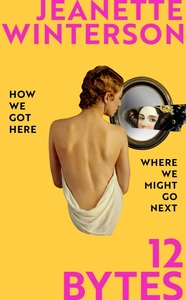Take a photo of a barcode or cover
informative
inspiring
reflective
fast-paced
Plot or Character Driven:
N/A
Strong character development:
N/A
Loveable characters:
Yes
Diverse cast of characters:
N/A
Flaws of characters a main focus:
N/A
informative
slow-paced
Plot or Character Driven:
N/A
Strong character development:
N/A
Loveable characters:
N/A
Diverse cast of characters:
N/A
Flaws of characters a main focus:
N/A
hopeful
informative
reflective
medium-paced
challenging
informative
medium-paced
challenging
funny
informative
reflective
medium-paced
Even if you don’t understand all the science covered in the book (lord knows I didn’t), you’ll come out of it having learned something! You’ll also come out of it mad about the past and (potentially) hopeful of the future!
12 bytes is Jeanette Winterson’s newest book. It’s a non-fiction looking at the future of AI, but, and I quote “not for AI fans in particular”. Don’t get me wrong, I’m a big fat nerd about a lot of things, but I’m not typically arsed by AI.
Despite that, I can’t believe how much I enjoyed this book. Like, you probably know that already because I’ve not stopped praising it on my stories.
From a history of computers, arguing that Frankenstein was the OG of this, to discussing the future of sex doll profitability, and how AI will impact religion, relationships, sexuality, jobs. This books covers it all and I am officially branding it as well he lovechild of Sapiens by Yuval Noah Harari and Invisible Women by Caroline Criado Perez. Sapiens is pretty expected I’m guessing- this is a book about history and future. Invisible women may be a surprise comparison, but of course Winterson addresses feminism in her book.
One thing I don’t usually do is encourage you to buy a book quickly, but I think this was so so cool to read because all it’s references were current. There’s slating of Elon Musk and Jeff Bezos (whey), a examination of the gendered messages behind The Queen’s Gambit, the inequality throughout the Tokyo Olympics, the fact we are all sick of Zoom meetings. I could go on for ages about this book but I am TRYING not to blab too much.
As you can tell, I enjoyed this so much and it’s already standing as non-fiction I’ll recommend a lot to folk.
Despite that, I can’t believe how much I enjoyed this book. Like, you probably know that already because I’ve not stopped praising it on my stories.
From a history of computers, arguing that Frankenstein was the OG of this, to discussing the future of sex doll profitability, and how AI will impact religion, relationships, sexuality, jobs. This books covers it all and I am officially branding it as well he lovechild of Sapiens by Yuval Noah Harari and Invisible Women by Caroline Criado Perez. Sapiens is pretty expected I’m guessing- this is a book about history and future. Invisible women may be a surprise comparison, but of course Winterson addresses feminism in her book.
One thing I don’t usually do is encourage you to buy a book quickly, but I think this was so so cool to read because all it’s references were current. There’s slating of Elon Musk and Jeff Bezos (whey), a examination of the gendered messages behind The Queen’s Gambit, the inequality throughout the Tokyo Olympics, the fact we are all sick of Zoom meetings. I could go on for ages about this book but I am TRYING not to blab too much.
As you can tell, I enjoyed this so much and it’s already standing as non-fiction I’ll recommend a lot to folk.
funny
informative
reflective
medium-paced
In “12 Bytes: How AI Will Change the Way We Live and Love,” Jeanette Winterson presents a fascinating exploration into the world of artificial intelligence. Known for her deep curiosity and expertise in creative non-fiction, Winterson masterfully intertwines AI with diverse realms such as history, mythology, literature, and socio-political issues. The book comprises twelve essays, each a unique blend of humor, empathy, and intellectual rigor, offering insights into AI’s impact on society.
Initially, “12 Bytes” challenged my expectations. When I first picked it up in 2022, the opening essay didn’t capture my interest, leading me to set the book aside. However, a revisit in 2024 changed my perspective. Winterson’s engaging storytelling and insightful narrative made for an enjoyable week-long read. Her ability to interconnect essays and introduce complex topics with an element of surprise was both refreshing and intellectually stimulating.
Jeanette Winterson’s arguments in “12 Bytes” are robust, well-researched, and compelling. She demonstrates a profound understanding of AI and its societal implications, presenting her knowledge in a way that’s both accessible and engaging. Her expertise shines through each essay, making complex topics relatable and thought-provoking.
The book is an easy and enjoyable read. Winterson’s unique storytelling style, characterized by a mix of educational content, dry humor, and occasional provocation, holds the reader’s interest throughout. The structure of interconnected essays enhances the overall experience, making complex AI topics approachable and engaging.
While “12 Bytes” does not directly compare with other AI-focused literature, its unique blend of humor, philosophical musings, and storytelling sets it apart. Winterson’s approach offers a fresh perspective in the non-fiction AI genre.
Winterson’s treatment of gender bias and inequality is notable. Instead of direct confrontation, she weaves these themes into the narrative in unexpected ways, enriching the reader’s experience and offering new insights into familiar topics.
“12 Bytes” is a highly recommended read for its enlightening, entertaining, and thought-provoking content. Jeanette Winterson’s storytelling prowess makes complex subjects accessible and enjoyable, marking this book as a significant contribution to discussions about AI’s role in our lives.
Initially, “12 Bytes” challenged my expectations. When I first picked it up in 2022, the opening essay didn’t capture my interest, leading me to set the book aside. However, a revisit in 2024 changed my perspective. Winterson’s engaging storytelling and insightful narrative made for an enjoyable week-long read. Her ability to interconnect essays and introduce complex topics with an element of surprise was both refreshing and intellectually stimulating.
Jeanette Winterson’s arguments in “12 Bytes” are robust, well-researched, and compelling. She demonstrates a profound understanding of AI and its societal implications, presenting her knowledge in a way that’s both accessible and engaging. Her expertise shines through each essay, making complex topics relatable and thought-provoking.
The book is an easy and enjoyable read. Winterson’s unique storytelling style, characterized by a mix of educational content, dry humor, and occasional provocation, holds the reader’s interest throughout. The structure of interconnected essays enhances the overall experience, making complex AI topics approachable and engaging.
While “12 Bytes” does not directly compare with other AI-focused literature, its unique blend of humor, philosophical musings, and storytelling sets it apart. Winterson’s approach offers a fresh perspective in the non-fiction AI genre.
Winterson’s treatment of gender bias and inequality is notable. Instead of direct confrontation, she weaves these themes into the narrative in unexpected ways, enriching the reader’s experience and offering new insights into familiar topics.
“12 Bytes” is a highly recommended read for its enlightening, entertaining, and thought-provoking content. Jeanette Winterson’s storytelling prowess makes complex subjects accessible and enjoyable, marking this book as a significant contribution to discussions about AI’s role in our lives.
adventurous
funny
hopeful
informative
lighthearted
medium-paced
challenging
informative
inspiring
medium-paced
This is a gripping read, to say gripping doesn’t sound quite right for a non-fiction as Jeanette Winterson shares her discoveries of AI.
I also found this a fun read, with its wonderful description of transistor radios and how computers used to be room sized. I was also amused with chapter headings like A Loom with a View and I Love Therefore I am.
The book is a collection of 12 essays, 13 if it’s the 2022 edition, and (to my thrill) it starts with Ada Lovelace; and then gets better as Jeanette Winterson makes a connection to her and Mary Shelley (and her novel Frankenstein), and then later Alan Turin.
This was all before moving on to show the developing tech and AI, which was done by gathering an assortment of ideas, including Vampires (chapter on how life can be extended, this was an eye opener), and the mathematician Marvin Minsky (chapter where Jeanette Winterson shares why she thinks the human brain is receptive to AI). All this was leading up to the next stage, AGI.
AGI, artificial general intelligence, when it happens, will be the big changer.
In this book Jeanette Winterson raises questions (about identity and privacy, and how big companies, including social media platforms, are making profit from data), but I wouldn’t call her a sceptic, in fact, she welcomes AI (and gives many examples that show how it will help and make things better). In places she sounds very excited about this tech, but at the same time not shying away to show how things will be trickier if AI and AGI are only managed and handled by the private sector.
I like tech but I haven’t given much thought to humans and bots living side by side, this book may not cover everything but it has got me thinking.
I also found this a fun read, with its wonderful description of transistor radios and how computers used to be room sized. I was also amused with chapter headings like A Loom with a View and I Love Therefore I am.
The book is a collection of 12 essays, 13 if it’s the 2022 edition, and (to my thrill) it starts with Ada Lovelace; and then gets better as Jeanette Winterson makes a connection to her and Mary Shelley (and her novel Frankenstein), and then later Alan Turin.
This was all before moving on to show the developing tech and AI, which was done by gathering an assortment of ideas, including Vampires (chapter on how life can be extended, this was an eye opener), and the mathematician Marvin Minsky (chapter where Jeanette Winterson shares why she thinks the human brain is receptive to AI). All this was leading up to the next stage, AGI.
AGI, artificial general intelligence, when it happens, will be the big changer.
In this book Jeanette Winterson raises questions (about identity and privacy, and how big companies, including social media platforms, are making profit from data), but I wouldn’t call her a sceptic, in fact, she welcomes AI (and gives many examples that show how it will help and make things better). In places she sounds very excited about this tech, but at the same time not shying away to show how things will be trickier if AI and AGI are only managed and handled by the private sector.
I like tech but I haven’t given much thought to humans and bots living side by side, this book may not cover everything but it has got me thinking.







